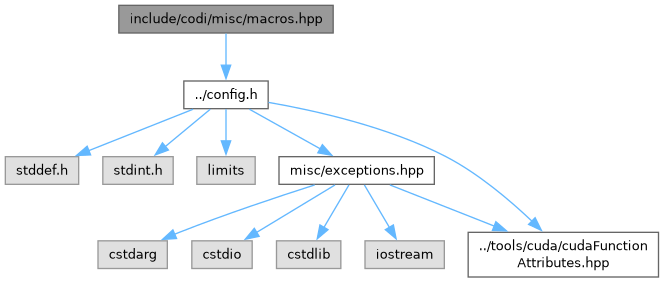#include "../config.h"

Go to the source code of this file.
Classes | |
| struct | codi::CODI_UNION< First > |
| Creates a union of interface definitions. More... | |
Namespaces | |
| namespace | codi |
| CoDiPack - Code Differentiation Package. | |
Macros | |
| #define | CODI_ENABLE_CHECK(option, condition) |
| #define | CODI_TO_STRING(expression) |
| Conversion macro. | |
| #define | CODI_TO_STRING2(expression) |
| Conversion macro. | |
| #define | CODI_UNUSED_ARG(arg) |
| Used in a constexpr context, where using CODI_UNUSED spoils the constexpr. | |
| #define | CODI_WRAP_FUNCTION(NAME, FUNC) |
| Wrap a function in a function object. Used for performance optimizations. | |
| #define | CODI_WRAP_FUNCTION_TEMPLATE(NAME, FUNC) |
| Wrap a function in a function object. Used for performance optimizations. | |
Default template type declarations | |
These templates are used to employ the design guideline for the default definitions of template arguments. See Template declarations for Details. | |
| #define | CODI_ANY int |
| Used in default declarations of expression templates. | |
| #define | CODI_ANY_T(Type) |
| Like CODI_ANY but with a specific type. | |
| #define | CODI_DD(Type, Default) |
| Abbreviation for CODI_DECLARE_DEFAULT. | |
| #define | CODI_DECLARE_DEFAULT(Type, Default) |
| #define | CODI_IMPLEMENTATION ImplProxy |
| Used in interface declarations to indicate the type of the implementing class. | |
| #define | CODI_STATIC_ASSERT(cond, message) |
| Static assert definition for CoDiPack. Not evaluated in IDE mode. | |
| #define | CODI_T(...) |
| Abbreviation for CODI_TEMPLATE. | |
| #define | CODI_TEMPLATE(...) |
| Expand template types in preprocessor macros. | |
| #define | CODI_UNDEFINED char |
| Used in interface declarations for types that have to be defined in the specializations. | |
| #define | CODI_UNDEFINED_VALUE false |
| Used in interface declarations for variables that have to be defined in the specializations. | |
Functions | |
| template<typename... Args> | |
| inlinevoid | codi::CODI_UNUSED (Args const &...) |
| Disable unused warnings for an arbitrary number of arguments. | |
| #define CODI_ANY_T | ( | Type | ) |
Like CODI_ANY but with a specific type.
| #define CODI_DD | ( | Type, | |
| Default ) |
Abbreviation for CODI_DECLARE_DEFAULT.
| #define CODI_DECLARE_DEFAULT | ( | Type, | |
| Default ) |
CODI_IDE can be defined to use the default declaration of type names. This enables auto completion in the IDEs.
Every using declaration in all CoDiPack classes should declare its variables as: using TYPE = CODI_DECLARE_DEFAULT(T_TYPE, Default);
| #define CODI_ENABLE_CHECK | ( | option, | |
| condition ) |
Check the condition only if the option is true, otherwise the result is always true. Used like if(CODI_ENABLE_CHECK(option, condition)) {...}, option == false means that the if body is always executed.
| #define CODI_STATIC_ASSERT | ( | cond, | |
| message ) |
Static assert definition for CoDiPack. Not evaluated in IDE mode.
Static assert in CoDiPack.
| #define CODI_T | ( | ... | ) |
Abbreviation for CODI_TEMPLATE.
| #define CODI_TEMPLATE | ( | ... | ) |
Expand template types in preprocessor macros.
| #define CODI_TO_STRING | ( | expression | ) |
Conversion macro.
| #define CODI_TO_STRING2 | ( | expression | ) |
Conversion macro.
| #define CODI_UNUSED_ARG | ( | arg | ) |
Used in a constexpr context, where using CODI_UNUSED spoils the constexpr.
| #define CODI_WRAP_FUNCTION | ( | NAME, | |
| FUNC ) |
Wrap a function in a function object. Used for performance optimizations.
| #define CODI_WRAP_FUNCTION_TEMPLATE | ( | NAME, | |
| FUNC ) |
Wrap a function in a function object. Used for performance optimizations.